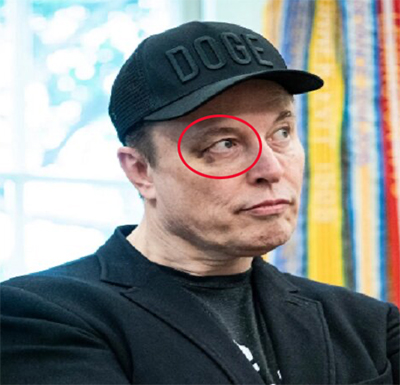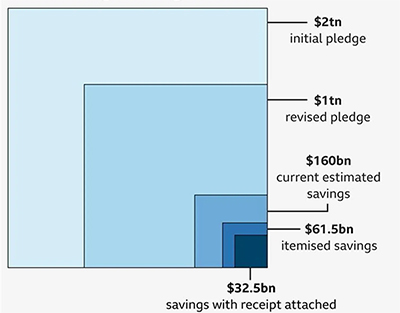

On Friday, Donald Trump conducted what must be the weirdest exit interview ever. It started with the boss praising departing employee Elon Musk without having a clue what, exactly, he did. Most of the praise was false. Trump also failed to mention that Musk functioned as an officer of the United States without Senate confirmation (despite that pesky constitutional requirement). He also didn't mention that Musk hired a bunch of 20-something hackers, who know nothing about government, to overrule duly nominated and confirmed cabinet officials and agency heads. For the benefit of those people who criticized Volodymyr Zelenskyy for not wearing a suit and tie in the Oval Office in February, neither did Musk, despite the entire world press corps playing close attention.
One thing that got a lot of attention was Musk's black eye:

Musk claims his son, X, playfully punched him in the eye. Maybe, but Shawn McCreech gave a longer list of suspects: some of the many women he impregnated; his 20-year-old trans daughter, Vivian Jenna Wilson, who hates him; all the people who have lit Teslas on fire, the entire federal bureaucracy, and his suburban Austin neighbors, who can't stand him. But the black eye is a good metaphor for his time in the government and departure from it. He promised to trim $2 trillion from the federal budget. An analysis by the BBC shows that his real savings was actually $32.5 billion, or about 1.6% of what he promised:

And even the $32.5 billion is probably an overestimate since it includes savings on things like not developing some vaccine, the cost of which is only an estimate until the research is concluded. The biggest actual savings is $2.9 billion for canceling a contract to house 3,000 unaccompanied migrant children in Texas (clearly an example of waste and fraud). Second biggest claim was a contract between IRS and an AI company called Centennial Technologies—at least if you ignore the fact that the contract was actually canceled at the end of the Biden administration. Number three was a $1.8 billion contract DoD gave to an IT services company called A1FEDIMPACT. None of the work was actually performed yet or paid for.
Furthermore, the net savings may be lower than the BBC calculation—and may well be negative—due to the government having to rehire critical workers he fired (or train new ones), lost productivity, defending lawsuits, lost tax collections due to cuts at IRS, and more. These may add up to as much as $135 billion. Also, another independent estimate puts the savings (excluding the extra cost of fixing the damage the DOGEys did) at only $16.3 billion. The conservative Manhattan Institute put the savings at less than 0.1% of the federal budget.
Although not directly related to Musk, the budget bill passed by the House is projected to add $4 trillion to the federal deficit over 10 years. Compared to that, even $32.5 billion is small potatoes. If Trump really wants to reduce the deficit, he needs to threaten to veto the bill unless Congress decimates it.
So, what is Musk's legacy? His reputation as a genius is in tatters, his car company is in crisis with net income down 71% in Q1, his fortune is diminished by $122 billion, and millions, maybe billions, of people hate his guts, all while achieving virtually nothing of lasting value. Oh, and his ability to buy elections is probably over, what with the drubbing his candidate took in the Wisconsin Supreme Court race in April. Sounds like a metaphorical black eye to us.
So why did Musk leave? We don't know, but it could be a combination of some of the following:
All of this said, could everyone's take on the Musk era be wrong? Maybe. Many of the articles about Musk's rise and fall center on the idea that he thought taming the government would be easy, but he discovered the hard way that it wasn't and that everything in the budget had one or more champions in Congress who most definitely did not want it cut. However, a case can also be made that Musk didn't fail at all. If you see his real goal as gutting those parts of the government he didn't like (or Trump didn't like) like USAID, and couldn't get Congress to kill, he may have been successful in killing them. Various oversight agencies, the ones that keep an eye on companies like Tesla and on billionaire stock investors like Musk, have also been badly hobbled, and may take a long time to bounce back. He also scooped up a mass of government contracts for his own companies. In addition, he hoovered up a huge amount of data on American citizens for purposes only he knows.
The exit interview, and all the praise Trump heaped on Musk, plus carefully planted statements in some of the articles, might well be part of a well-orchestrated campaign to rehabilitate his public image. And it might work, if only the Democrats could figure out how to use him. Imagine the headline: "Trump's biggest donor, an electric car manufacturer, hates Trump's budget." Surely the Democrats could make some hay out of that if they tried hard, no matter how much they despise him. After all, he became famous for making electric cars popular. Democrats LIKE electric cars. They also like high-profile people dissing Trump's policies. Maybe they can somehow run with that.
Debra Kahn at Politico has a long article on why the Democrats should now cozy up to Musk on account of his opposition to Trump's efforts to kill off the clean-energy tax credits Joe Biden passed. Rep. Ro Khanna (D-CA), a leader of the House progressives, said: "Musk and I have had deep disagreements on his approach at DOGE, but on this issue [the tax credits] he is correct. Democrats should be able to recognize this." In other words, Democrats should try mightily to get Musk to work the Senate to remove those portions of the bill that kill the subsidies for green energy and electric cars. "Working" the Senate might include threatening Republican senators who support the House bill with well-funded primary opponents. Musk also has Trump's ear and what is left of eX-Twitter. On this one (important) issue, he is actually aligned with the Democrats, albeit for very different reasons (keeping his fortune intact). But support is support, wherever you can find it. As they say, politics makes strange bedfellows. (V)